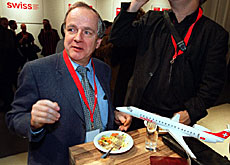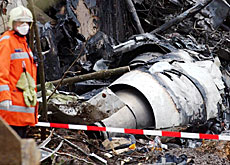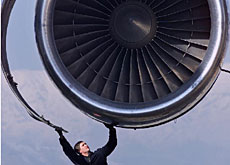“If you fly you should be aware of the risks”

Sepp Moser, a leading Swiss aviation journalist and industry consultant, says flying is still "very safe" and that he trusts most airlines.
But, while he argues that the chances of a crash are not high, he says it pays to brace for the worst.
In “How safe is flying?” – a new book about to be published in German – Moser provides a detailed and often nerve-wracking glimpse of all the things that can go wrong.
Yet Moser remains a staunch believer in the safety of today’s airline industry.
swissinfo spoke to Sepp Moser ahead of the book’s release.
swissinfo: What’s the point of writing, “How safe is flying?”. Aren’t you just playing on people’s basic fear of flying?
Sepp Moser: This is the question people ask. How safe is it? Man is made to move in several different ways by nature. He may walk, he may swim, but he does not fly. And that’s why many people have hidden fears.
Actually, I hope it will alleviate their fears because flying is very, very, safe. It’s not absolutely safe and it’s not perfect – but flying is as close to perfection as you could imagine.
swissinfo: That said, though, nobody forgets the image of a plane crash.
S.M.: That’s true. If there’s a plane crash, say in Papua New Guinea, it’s recorded in the Swiss newspapers. If there’s a car crash in the same place, nobody is interested.
And plane crashes have a very emotional effect because they often, although not always, involve lots of casualties.
swissinfo: For an ordinary person booking a flight, is there any way they can make it even safer through the choices they make?
S.M.: The most important thing is that if you fly you should be aware of the risks. This is the same attitude that should prevail when you board a bus or a car or anything.
In the case of flying, this means you should always pay attention to the safety instructions. You shouldn’t read the newspaper when they present the floorshow. Look for where the oxygen masks drop out. Check for a life-vest under the seat, sometimes it’s stolen.
The more you are mentally prepared for an accident, the better your chance of survival if it happens.
It really doesn’t matter where you sit, because accidents are so diverse in nature. There are many instances where people in the front of the cabin have survived. You will probably be a little safer if you’re near an emergency exit.
swissinfo: But in the real world, when a plane crashes, how much does safety information really increase your chance of survival?
S.M.: I can’t give you a figure. I can only say that it does.
Most accidents are mishaps during take-off and landing and are in some way survivable.
In these cases it may help a lot to know where the emergency exit is, and there are many cases that prove this.
swissinfo: Have you ever found yourself in a situation where you’ve decided not to board an aeroplane?
S.M.: Once, more than 30 years ago.
It was in Laos and I was about to fly in a very old DC-3 and at the airport I noticed oil dripping out of one engine. But in hindsight I was wrong, because the plane took off and in the evening it returned without mishap.
swissinfo: Your book goes into detail about what can go wrong. But at the end of the day, the biggest cause of accidents is human error.
S.M.: Absolutely, and for two reasons. Firstly, man is the only component of the air-transport system that has not been developed during the past few thousand years.
And secondly, everything in aviation is man made, and [therefore] subject to error.
The pilot is usually the first to be blamed because he is usually the first to arrive at the scene of an accident. By definition, he’s the first culprit. And often pilots make mistakes.
swissinfo: What kind of impact are low-cost airlines having on aviation safety?
S.M.: According to the statistics they don’t influence safety in any negative way.
In fact, low-cost airlines as we have them now are as safe as so-called high-cost or network airlines. Safety is a matter of culture and not about spending millions of dollars.
In Switzerland we had a safety audit after two accidents in this country. The audit came to the conclusion that the only low-cost airline we had at that time, [Crossair], was the safest.
So you can’t say that low-cost equals dangerous.
swissinfo: A lot has been said about the national airline, Swiss, and its ability to survive as a business. Could this financial pressure be impacting its safety standards? Is Swiss safe?
S.M.: Yes [Swiss is safe].
If an airline is in dire financial straights, there is certainly a temptation to save on safety. But no airline manager will do that.
All airline managers, even in the poorest African country, will do whatever they can to keep up safety.
swissinfo: You’ve devoted a chapter to the issue of terrorism, which has led to thousands of deaths in the air over the last 40 years. But isn’t the current obsession with security making flying too unwieldy?
S.M.: You have to check in early, undergo annoying procedures and almost undress before you can board a plane – things like that make flying less attractive.
And all these measures haven’t increased safety, because the system as a whole is still very, very vulnerable.
swissinfo: Is Switzerland a safe place to fly, given the dangers posed by the Alps, the narrow airspace and the fact that when you look up on a sunny day, the sky is literally criss-crossed by passenger jets?
S.M.: Generally, flying is safe in countries where the standard of living and the culture of safety are highly developed.
If you have no problem with having an appendix operation in a country, then it’s safe to fly there. For instance if you have a choice, you’d have your appendix removed in Norway, Switzerland, Canada or Australia, versus say Zimbabwe or Bolivia. It’s the same with aviation.
swissinfo: Let’s say you need to fly to London or New York in the next few days. How do you choose the airline? On the basis of safety or the price of the ticket?
S.M.: My primary concern is network quality and flight plan. I want to get where I’m going at the time and day of my choice. That’s my primary concern.
Then comes price, and safety is not really a concern because I trust almost every airline in the world.
swissinfo, interview: Jacob Greber in Winkel, Zurich
Sepp Moser is one of the German-speaking world’s best-known aviation writers.
He has published more than a dozen books, including a Swiss bestseller on the collapse of Swissair in 2001.
A pilot, and frequent critic of the national airline Swiss, Moser also runs an aviation consultancy from his home near Zurich airport.
“How safe is flying?”, or “Wie sicher ist Fliegen?”, is published this month by Orell Füssli.

In compliance with the JTI standards
More: SWI swissinfo.ch certified by the Journalism Trust Initiative



You can find an overview of ongoing debates with our journalists here. Please join us!
If you want to start a conversation about a topic raised in this article or want to report factual errors, email us at english@swissinfo.ch.